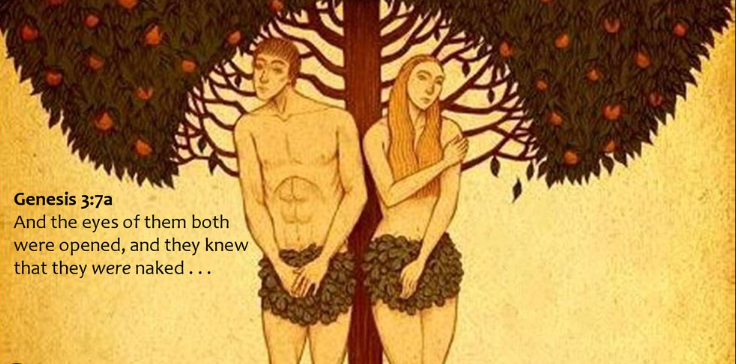Notice that the appeal the serpent made is quite an interesting one. It was an appeal to the flesh—“the tree was good for food”—but that is not all; that is not the thing that is really important.
“It was pleasant to the eyes”—it was an appeal to the psychological part of man, to his mind. “And a tree to be desired to make one wise”—this is an appeal to the religious side of man.
Genesis 3:6-13 KJV
[6] And when the woman saw that the tree was good for food, and that it was pleasant to the eyes, and a tree to be desired to make one wise, she took of the fruit thereof, and did eat, and gave also unto her husband with her; and he did eat.
[7] And the eyes of them both were opened, and they knew that they were naked; and they sewed fig leaves together, and made themselves aprons.
[8] And they heard the voice of the LORD God walking in the garden in the cool of the day: and Adam and his wife hid themselves from the presence of the LORD God amongst the trees of the garden.
[9] And the LORD God called unto Adam, and said unto him, Where art thou?
[10] And he said, I heard thy voice in the garden, and I was afraid, because I was naked; and I hid myself.
[11] And he said, Who told thee that thou wast naked? Hast thou eaten of the tree, whereof I commanded thee that thou shouldest not eat?
[12] And the man said, The woman whom thou gavest to be with me, she gave me of the tree, and I did eat.
[13] And the LORD God said unto the woman, What is this that thou hast done? And the woman said, The serpent beguiled me, and I did eat.
Genesis 3:6
And when the woman saw that the tree was good for food, and that it was pleasant to the eyes, and a tree to be desired to make one wise, she took of the fruit thereof, and did eat, and gave also unto her husband with her; and he did eat.

You will find that this is the exact temptation that Satan brought to the Lord Jesus in the wilderness (see Matt. 4, Mark 1, and Luke 4). First of all, he said to our Lord, “Make these stones into bread”—this was the appeal to the flesh, as the tree was good for food.
Then Satan showed the Lord the kingdoms of the world and offered them to Him—that was an appeal to the mind, as the tree was pleasant to the eyes. Then finally he said, “Cast Yourself down from the temple”—this was an appeal to the religious side of man, as the tree was to be desired to make one wise.
I do not think that the Devil has changed his tactics today. He uses the same tactics with you and me, and the reason that he still uses them is that they work. He hasn’t needed to change his tactics, for we all seem to fall for the same line.
John wrote: “For all that is in the world, the lust of the flesh, and the lust of the eyes, and the pride of life, is not of the Father, but is of the world” (1 John 2:16). “The lust of the flesh”—that is, the tree was good to eat.
“The lust of the eyes”—the tree was good to look at. “The pride of life”—the tree was to be desired to make one wise. These things are not of the Father, but of the world. Jesus said that these sins of the flesh come out of the heart of man, way down deep.
This is where Satan is making his appeal. This is the method that he is using in order that he might reach in and lead mankind astray. And he succeeded.
They were told that they would know good and evil—and what happened?
We now have the results of the fall of man. This presents the lust of the eyes. This presents the lust of the flesh. This exemplifies the pride of life. This constitutes the Fall of humanity.
This refers to the fact that evidently Adam was an observer to all these proceedings; Some claim that he ate of the forbidden fruit which she offered him out of love for her; however, no one ever sins out of love; Eve submitted to the temptation out of deception, but “Adam was not deceived” [I Tim. 2:14]; he fell because of unbelief; he simply didn’t believe what God had said about the situation; Contrast Verse 6 with Luke 4:1-13; both present the three temptations, “the lust of the flesh,” “the lust of the eyes,” and “the pride of life”; the first man falls, the Second Man conquers.
One could argue these are the most tragic words in human history. Sin enters into the world, into God’s “very good” creation, for the first time. Verses 1 through 5 describe the temptation to sin, but it’s not until the moment described here that the line is crossed.
Satan has encouraged the first woman to doubt the words of God and the goodness of God. He has tempted her to place herself above God as a moral judge.
The verse reveals Eve’s three motivations for crossing that line: The tree’s fruit could satisfy her body’s appetite for food, the tree was visually attractive, and the tree could make her wise.
Those motivations line up closely with the Apostle John’s description of the things which still drive the world as we know it today: the lust of the flesh, the lust of the eyes, and the pride of life (1 John 2:16).
In response, Eve takes the fruit, eats it, gives some to Adam, and he eats also. The mention of Adam is a bit abrupt in the context of the story, as is his willingness to follow Eve’s lead.
Does the Bible’s statement that “her husband, who was with her” mean Adam has been present for the entire conversation?
If so, why did he remain silent?
Why didn’t he jump in and stop it?
If he has come into the picture later, why wouldn’t he question her choice, or resist?
In any case, Adam’s sin is no less than Eve’s. In fact, according to the Bible, it’s Adam’s sin which causes the fall of man (Romans 5:12). Some people willingly engage with temptation and dive into sin; some let others make that decision for them. Some follow the crowd instead of standing up for what they know is right.
Both humans are guilty, as will become clear in the following verses.
Genesis 3:7
And the eyes of them both were opened, and they knew that they were naked; and they sewed fig leaves together, and made themselves aprons.

“And the eyes of them both were opened”—this refers to their conscience. Before the fall, man did not have a conscience; he was innocent. Innocence is ignorance of evil. Man did not make conscience.
It is an accuser that each one of us has living on the inside of us. “And they knew that they were naked; and they sewed fig leaves together, and made themselves aprons.”
Have you ever noticed that the fig tree is the only tree that is specifically mentioned?
The tree of the knowledge of good and evil is not an apple tree. I do not know what it was, but I am almost sure it was not an apple tree. These fig leaves concealed but did not really cover. Adam and Eve did not confess; they just attempted to cover up their sin.
They were not ready to admit their lost condition. This is the same condition of man today in religion. He goes through exercises and rituals, he joins churches, and he becomes very religious.
Have you ever noticed that Christ cursed the fig tree?
That is quite interesting. And He denounced religion right after that, by the way; He denounced it with all His being because religion merely covers over sin. In this temptation Satan wanted to come between man’s soul and God.
In other words, he wanted to wean man from God, to win man over to himself, and to become the god of man. The temptations of the flesh would not have appealed to man in that day, anyway. He was not tempted to steal or lie or covet. He was just tempted to doubt God.
What was the trouble with the rich young ruler?
He did not believe God. In the parable of the tares, the tares are those who would not believe God. Notice Satan’s method. First, Eve saw that the tree was good for food; second, it was pleasant to the eye; and third, it was to be desired to make one wise.
Satan works from the outside to the inside, from without to within. On the other hand, God begins with man’s heart. Religion is something that you rub on the outside, but God does not begin with religion.
May I make a distinction here: Christianity is not a religion; Christianity is Christ. There are a lot of religions, but the Lord Jesus went right to the fountainhead when He said, “Ye must be born again.”
He said to the Pharisees who were very religious on the outside, “Make the inside of the platter clean. You are just like a mausoleum, beautiful on the outside with marble and flowers, but inside full of dead men’s bones.” What a picture!
And Adam and Eve, instead of confessing their sin, sewed fig leaves together as a covering. May I say to you, there is really no new style in fig leaves. Men are still going to church and going through religious exercises and good works instead of confessing the sin of their hearts.
This refers to the consciousness of guilt as a result of their sin. This refers to the fact that they had lost the covering light of purity, which previously had clothed their bodies. Now, the sinners clothe themselves with morality, sacraments, and religious ceremonies; they are as worthless as Adam’s apron of fig leaves.
In the previous verse, the first woman crossed the line from engaging with temptation to willfully disobeying God’s command. She is followed soon after by the first man, Adam. This is literally ancient history, but it’s still heartbreaking.
Part of the reason it resonates so painfully is that we’ve all had the experience of engaging with and falling to temptation. Adam and Eve started the ball rolling, but all of us who have lived have kept it going (Romans 3:23).
Within the context of the story, the immediate consequence of their sin is unexpected and also tragic. Just as the serpent said, their eyes were opened. They now understood many things, including both good and evil. But this wasn’t the wisdom either was hoping for.
Genesis 2:25 tells us pointedly that before their sin, Adam and Eve were both naked and unashamed. They were truly innocent, so their nudity was sinless and free of shame. Now, instantly, they are aware and ashamed.
Though they’d never worn clothes before, the knowledge of good and evil creates a fearful urge to cover themselves, to hide from each other, to mistrust the other person’s motives and thoughts, and to protect themselves.
This was just the beginning, though. The consequences for their sinful rebellion would be deeply devastating for them and for all of us to follow.
Genesis 3:8
And they heard the voice of the LORD God walking in the garden in the cool of the day: and Adam and his wife hid themselves from the presence of the LORD God amongst the trees of the garden.

It may seem odd that God is described as walking in the garden, since “God is a spirit” (John 4: 24). The language is most likely a way of portraying the closeness that has characterized the relationship between God and the two humans to this point.
One may assume that Adam and Eve’s “walk” up to now has pleased God, and they have welcomed the opportunity to walk with Him whenever He comes into the garden. That situation is about to change.
Adam and his wife no longer welcome the sound of God’s approach. The trees of the garden that have been given to them for their pleasure and enjoyment (Genesis 2: 16) are now used as a shield to hide behind. The two are trying to avoid having to face the Lord.
Adam and Eve have sinned against God. In direct disobedience to His command, they have eaten from the Tree of the Knowledge of Good and Evil. The previous verse revealed the first consequence of their sin.
They moved from being innocently naked and unashamed to being self-conscious over their nakedness and desperate to cover themselves. Now we see their shame and guilt also drives them to hide from God. Their sin has broken their intimate relationship with Him.
The implication of this verse is that God would regularly come to the garden to spend time with Adam and Eve. It’s impossible to know exactly what that would have been like. The passage raises many interpretations.
How does God, who is a spirit, “walk?” What form did He take to be with them? Some see this as a purely metaphorical expression. Others imagine this to be a pre-incarnate Jesus Christ.
What we will see, though, is that one of the greatest consequences of sin was the loss of those face-to-face moments with the Creator. Instead of enjoying His presence, Adam’s and Eve’s first instinct was to hide from Him. Sin always separates us from God.
Genesis 3:9
And the LORD God called unto Adam , and said unto him, Where art thou?
God already knows where Adam is, of course. God asks Where art thou? because Adam needs to know that God desires a word with him. Religion will separate you from God—and Adam is lost. Adam is lost, and it is God seeking him and not man seeking God.
Previous verses revealed the first consequence of human sin: shame and guilt. The combination of knowledge, disobedience, and human frailty led to an overpowering urge to be covered and to hide from God. Prior to this, the nakedness of Adam and Eve was nothing to be ashamed of.
Their minds were pure and innocent, so there was no reason to be embarrassed or self-conscious. The immediate result of having their eyes opened to good and evil was that the man and woman understood their own evil and the goodness they had lost.
Adam had never hidden from God before. God had never had to ask where the man was. It’s not that God did not know, of course. God’s question here is no different from any other parent who asks a question to their child, when they already know the answer. God wants Adam to answer, to reveal himself to God, and to confess.
It should be noted that the Hebrew word for “you,” both here and in verse 11, is singular. In other words, at this moment, God is not calling to Eve, or challenging her actions. He is not asking “where are you [two]?” He is specifically asking, “where are you, [Adam]?”
Adam, right from the beginning, is treated as the one ultimately responsible for the fall of mankind (Romans 5:12).
Genesis 3:10
And he said, I heard thy voice in the garden, and I was afraid, because I was naked; and I hid myself.

Adam’s admission of being afraid signals the end of the closeness that has characterized the relationship that he and Eve have enjoyed between themselves and God to this point. The nakedness that had produced no shame previously (Genesis 2: 25) is now a source of shame.
Adam is not fully naked at this point since both he and Eve have clothed themselves (3: 7). But even though Adam has covered his physical nakedness, he senses that he has not covered it enough to be comfortable in the presence of God.
It is tragically, painfully clear at this point that the serpent has lied. Yes, the eyes of the two humans are open as the serpent had promised (Genesis 3: 5 , 7); but “knowing good and evil” (v. 5) is not the pleasurable experience that the serpent had led them to believe it would be.
Adam “knows” he is guilty of the evil of breaking God’s commandment; he “knows” he can no longer be close with God. It would have been far better for him simply to have trusted and obeyed God than to possess the bitter knowledge that he has acquired through disobedience.
In the previous verse, God called out to the hiding Adam: “Where are you?” This used a singular term, meaning one “you,” not a plural “you” which would include both Adam and Eve.
God asked this question in the same way parents ask their disobedient child to explain an incident. He already knows the truth, but the question gives the child an opportunity to confess and do the right thing.
In this verse, Adam answers. It’s easy to picture him wide-eyed, desperate in the awareness of what he has done. He is full of shame at his newly-perceived nakedness, and fearful of how God will respond. It’s crucial to remember that this moment is unprecedented.
Human sin had never happened before. No process existed for confession, judgment, or restoration. Adam, in this moment, honestly has no idea what to expect. He has no knowledge of how God will react, and knows only a desperate need to hide his unholy sin from a holy God.
Adam’s response is not the whole story, of course. He does not immediately confess to eating from the restricted tree. He admits his fear, likely an entirely new emotion. He focuses on his nakedness, not wanting to be seen by God.
Genesis 3:11
And he said , Who told thee that thou wast naked? Hast thou eaten of the tree, whereof I commanded thee that thou shouldest not eat?
Again, it is not information that God seeks as He questions Adam. Rather, the questions are designed to get Adam to realize something.
The second of the Lord’s questions goes straight to the heart of the matter: has Adam disobeyed the clear command given him by his Creator?
Overwhelmed with shame after disobeying God, by eating from the Tree of the Knowledge of Good and Evil, Adam and Eve attempted to hide from God. This was foolish, of course. These first humans had never sinned, had never thought to hide from God. And yet, they should have known, that such a thing is not possible.
When God asked where Adam was, Adam’s response was that he hid because he was afraid and naked. Once again, God asks a question He knows the answer to in order to force Adam to admit his own actions. He demands an explanation of who told Adam of his nakedness.
Had they disobeyed Him?
All these centuries later, each of us can relate to this moment at a fundamental level. We all know what it is to give in to temptation, to sin, to be caught, and to face the question about what we have done. Because sin entered into the world, this is a foundational human experience being played out for the first time.
Genesis 3:12
And the man said, The woman whom thou gavest to be with me, she gave me of the tree, and I did eat.

Adam avoids giving direct answers to the Lord’s questions. Instead, Adam points an accusing finger at the woman— the very person whom he had earlier described ecstatically as “bone of my bones, and flesh of my flesh” (Genesis 2: 23)!
Now it appears that he wants nothing to do with her. Adam even suggests that some blame be placed upon the Lord since Eve is the woman whom thou gavest to be with me.
Perhaps Adam is implying that being “alone” would not have been such a bad thing after all, in contrast with what the Lord had stated (2: 18). Adam is correct when he says she gave me of the tree, and I did eat.
That is indeed what happened according to Genesis 3: 6 . But for Adam to create a scenario that absolves him of all guilt and responsibility is a consequence of the fall that humans continue to practice and perfect.
Notice that there is no confession on Adam’s part. The important thing is not so much that he blamed the woman or, as we would say in the common colloquialism of the day, we call it “blame-shifting, or he passed the buck,”.
But there is no confession of sin on his part.
Adam and Eve have introduced human sin into the world. They gave into temptation; they disobeyed God. The wisdom of knowing good and evil that they hoped to discover turned out to be a gift of shame and separation.
They came to know evil by participating in it. In the previous verse, God asked Adam directly, “Have you eaten of the tree of which I commanded you not to eat?”
In Adam’s response, we see the next consequence of human sin. The first was overwhelming shame. The second was a deep desire to get away from the Creator.
Now we see that their choice to sin together will drive a wedge into Adam’s and Eve’s relationship to each other.
In short, faced with his own guilt, Adam looks for someone else to blame. This has been human instinct ever since. In one skillful sentence, he points the finger at both his wife and God: “The woman [blaming her], whom you [blaming God] gave to be with me” did this.
The implication of Adam’s words is an accusation. If is as if he is implying, “You’re actually to blame, because you made her, God. There’s something wrong with her. Yes, I went along, but I never would have done this if she hadn’t gone first. The whole thing should be between you and her.”
This is an ugly, embarrassing moment, but we should all understand it. Learning to take responsibility for our own sin does not come naturally.
Genesis 3:13
And the LORD God said unto the woman, What is this that thou hast done? And the woman said, The serpent beguiled me, and I did eat.

Here is some more of that so-called “buck passing.” Now God speaks to the woman. The tone appears a bit softer than that used with the man.
Perhaps this is because the man had received from the Lord himself the command not to eat from the forbidden tree (Genesis 2: 17), while the woman apparently knows of the command from the man.
Even so , the woman knew about this command before breaking it (3: 2 , 3). Eve admits more of the truth than Adam does. Her statement the serpent beguiled me may reveal some blame-shifting on her part, but the key word beguiled indicates that she knows that a deception has occurred.
The serpent is the source of the deception. The bliss and delight that he implied would belong to the man and the woman are nowhere to be found.
When directly questioned by God about whether he had eaten from the forbidden tree, Adam threw all of the responsibility on his wife, and God—anyone but himself.
Adam’s claim is not only that Eve gave him the fruit, but Adam goes so far as to remind God that the woman is there by God’s decision. Adam has already failed in his responsibility to be the leader and guardian of his wife. And he compounded it by trying to blame others for his actions.
Here, God turns His gaze on Eve and asks her a more open-ended question: What have you done? Eve’s response still shifts some of the blame, but it is far simpler, more direct, and more apologetic than Adam: “The serpent deceived me, and I ate.”
What we see in both responses is the beginning of another consequence for sin: broken human relationships. In fact, in God’s pronouncements about what will follow humanity’s choice to sin will become the normal course of life. These include deep strains in marriage relations, and in all the marriages to follow.
Before dealing with mankind, however, God first turns to the serpent.
I hope that you have really enjoyed this post,













This is a very detailed post on the fall of Adam and Eve in the Garden of Eden.
God had forbidden them to eat the fruit from the tree, yet they disobeyed Him. And one can argue that Eve was the wrongdoer in that she first bit into the fruit. But then when she offered it to Adam, he should have refused. Yet, he also ate the fruit.
It is interesting that even in modern life, people often try to pass the buck and blame others for their wrongdoing. Rather than just admitting guilt and showing remorse.
Thank you for the reminder to obey God.
Hello,
Thank you for commenting on this session of Holy Bible Study.
I agree with you, Adam should have rufused to eat of the fruit since GOD told him directly what the rules were. In our lives today, if we have been told something directly, there is no excuse we can use for disobedience.
Thanks again.
Blessings,
Jerry
As a Christian I found this article very interesting to read upon and I also believe that every devout Christian who goes through this would definitely agree with me as well also.
Getting this piece felt like a blessing, learning about who God is and how the revelation about himself felt so good to go through.
Hello Colly,
Thank you for using a portion of your valuable time to read and comment on The Man And Woman Disobey The Word Of GOD episode.
It pleases me to learn that this piece felt like a blessing to you.
Thanks Again,
Blessings My Friend!
I really like that you have shown how Adam and Eve were truly afraid and that they were truly mislead.
Every time I hear this story now, I think about a song my daughter showed me as a “parody” to this. It is called and there was steve. It is a take on how you shouldn’t be willing to give up what you NEED for what you WANT!!
Great SITE!!
Hello Mamabear,
Thank you for taking the time to comment about this epeisode on the HBS & DwJ website. I am pleased to learn that you consider this to be a Great website.
Thank you for your support,
Blessings To You My Friend!
This episode discusses the biblical story of Adam and Eve and their disobedience to God’s Word.
You explain how this act of disobedience led to the fall of man and the introduction of sin into the world. This episode also explores the consequences of disobedience and the importance of following God’s Word.
This episode is a powerful reminder of the importance of obedience to God’s Word and the consequences of disobedience. You provide a clear and concise explanation of the biblical story of Adam and Eve, making it accessible to readers who may not be familiar with it.
I appreciate the author’s emphasis on the need for obedience to God’s Word and the importance of seeking forgiveness when we fall short. This episode serves as a valuable reminder to readers that we are all human and make mistakes, but it is important to strive for obedience and seek forgiveness when we fall short.
Overall, this episode is a thought-provoking and insightful episode for anyone seeking to deepen their understanding of the importance of obedience to God’s Word.
I would recommend this episode to anyone looking for guidance and inspiration in their spiritual journey.
Hello pasindu,
Thank you for your reiteration of this very detailed episode. It is very much appreciated.
I also want to thank you for considering this episode a thought-provoking and insightful episode for anyone seeking to deepen their understanding of the importance of obedience to God’s Word, as well as, being willing to recommend this episode to anyone looking for guidance and inspiration in their spiritual journey.
Blessings My Friend!
We all want to pass the buck as Adam did in the Garden of Eden.
As you rightly said, the devil’s appeal was that of the flesh. And that is why we always fall when we attempt to overcome via our might, and we also cannot take responsibility for it.
Only a transformed life strengthened by the Holy Ghost can stand firm against satan’s schemes.
Hello Parameter,
Thank you for stopping by and commenting on yet another episode on the HBS & DwJ Podcast platform.
I must agree, we all do seem to want to pass the buck instead of taking on the consequences of our own actions. These actions, which started on a personal level, continued to grow into a family level, then a community level, on up to providence levels, country levels, all the way to world level.
You’re right, Only a transformed life strengthened by the Holy Spirit can stand firm against satan’s schemes.
Thanks again for your continued support,
Continued Blessings Unto You My Friend!